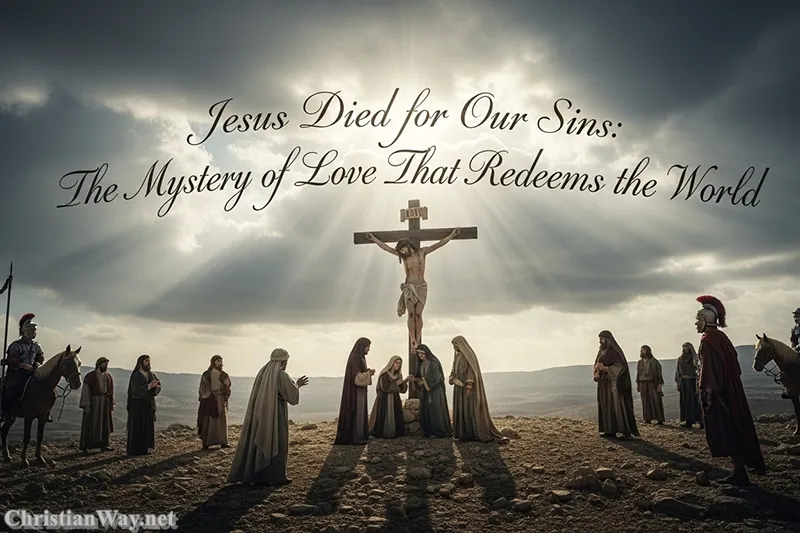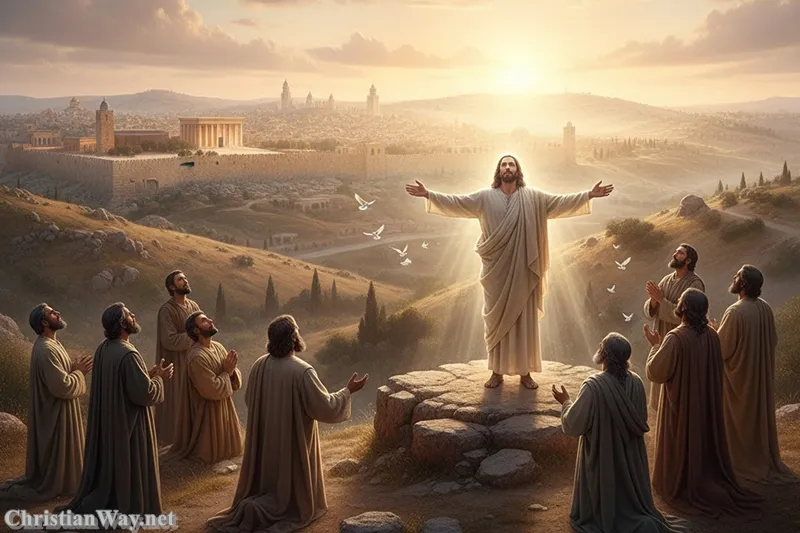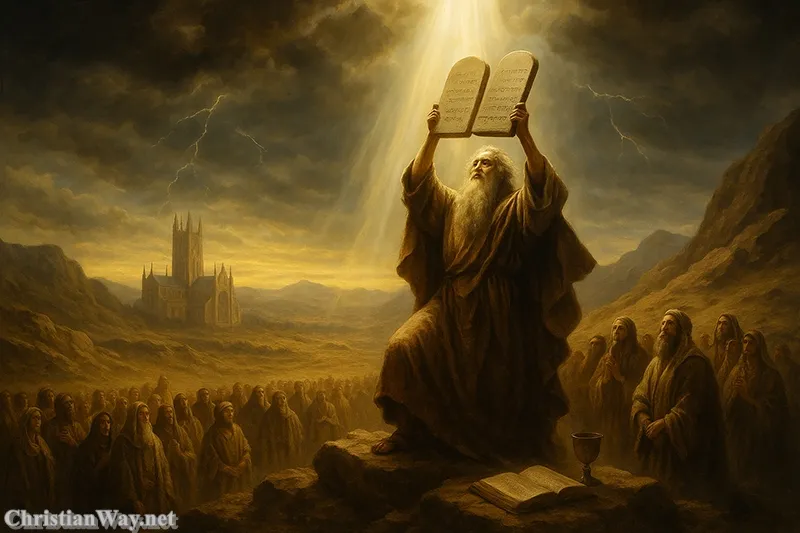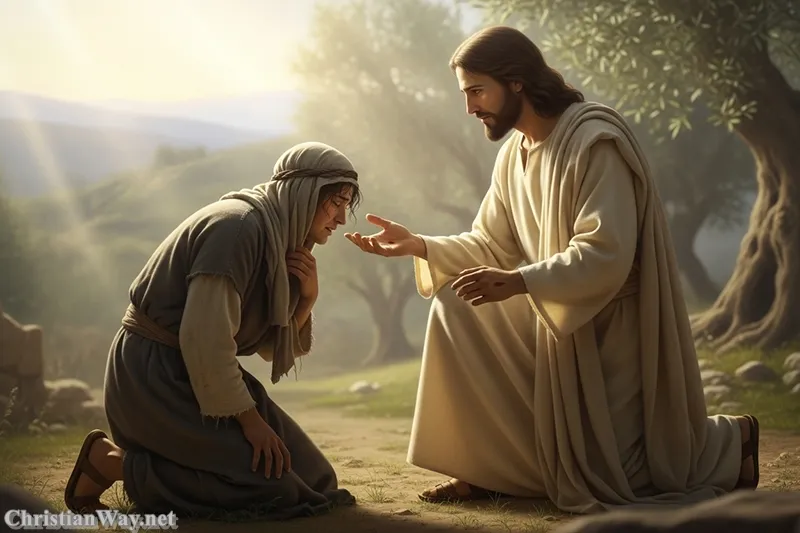Every human soul, in its quietest moments, senses a weight within — a longing for peace, a need for forgiveness, a cry for redemption. We may call it guilt, regret, or sorrow for the harm we have done and the good we have left undone. Yet beneath all these words lies one truth: humanity is wounded by sin.
Dear friends in Christ, it is into this deep wound of the human heart that the love of God entered, not with condemnation, but with mercy. The mystery of our salvation — that Jesus died for our sins — stands at the very center of Christian faith. It is not simply a doctrine to be learned, but a love to be encountered. The Cross of Christ is the meeting place between human misery and divine compassion, where death is overcome by life, and sin is swallowed up by grace.
The Meaning of “Jesus Died for Our Sins”
When we say “Jesus died for our sins,” we are confessing that the Son of God entered our broken story to set it right from within. He did not come as a distant rescuer, but as one who took upon Himself our suffering, our rejection, and the full consequence of human sin — separation from God.

Saint Paul writes, “God proves His love for us in that while we were still sinners, Christ died for us” (Romans 5:8). This is not a transaction; it is a revelation. The Cross is not a payment demanded by an angry God, but a gift offered by a loving Father. In Jesus Christ, the justice of God meets His mercy — not as two opposing forces, but as one eternal act of love that heals and restores.
The Weight of Sin and the Need for Redemption
The Reality of Sin
Sin is more than the breaking of a rule; it is the breaking of relationship — with God, with others, and with ourselves. Every act of pride, greed, or indifference tears the fabric of communion we were created to live in. Scripture tells us, “All have sinned and fall short of the glory of God” (Romans 3:23). We are not condemned by this truth; we are invited to humility. For in recognizing our need, we open our hearts to grace.
The Separation It Causes
Sin alienates us from the Source of life. Like Adam and Eve hiding from God in the garden, we too withdraw into shadows when we choose ourselves over love. Yet even there, God calls: “Where are you?” (Genesis 3:9). From the beginning, He has not ceased to seek us, to restore us, to bring us home.
The Cross: God’s Answer to Human Sin
The Lamb of God
In the Old Covenant, Israel offered sacrifices as signs of repentance — lambs and offerings that symbolized atonement. But all these were but shadows of the true Lamb who was to come. John the Baptist recognized Him, crying, “Behold, the Lamb of God, who takes away the sin of the world!” (John 1:29).
Jesus, the spotless Lamb, took upon Himself the burden of all humanity’s sin. He who was without sin entered into the deepest consequence of sin — death — to destroy it from within.
The Power of His Sacrifice
His suffering was not meaningless agony. It was love poured out to the end. “Greater love has no one than this: to lay down one’s life for one’s friends” (John 15:13). The Cross reveals that love is stronger than death, that forgiveness is more powerful than evil, and that mercy has the final word.
In the moment of His crucifixion, when He prayed, “Father, forgive them, for they know not what they do” (Luke 23:34), He was not merely forgiving those before Him; He was interceding for us all.
The Crucifixion: Love in Action
The Wounds that Heal
Every wound of Jesus speaks — the thorns, the nails, the pierced side — all tell of a love that enters our suffering and redeems it. Isaiah had foretold this long before: “He was wounded for our transgressions, crushed for our iniquities; upon Him was the punishment that brought us peace, and by His stripes we are healed” (Isaiah 53:5).
To look upon the Crucified Christ is to see the truth about both our sin and our salvation. We see what sin costs — and what love is willing to endure to save us.
The Triumph Hidden in Defeat
To the world, the Cross appeared as failure. Yet to faith, it is the throne of victory. Jesus did not fight evil with power or violence, but with the total surrender of love. In dying, He conquered death. In seeming defeat, He brought forth eternal triumph.
The Cross is not the end of the story; it is the doorway to resurrection.
Redemption: What Christ’s Death Means for Us
Forgiveness and Reconciliation
Because Jesus died for our sins, we no longer live under condemnation. Saint Paul proclaims, “There is therefore now no condemnation for those who are in Christ Jesus” (Romans 8:1). Through His death and resurrection, He reconciled us to the Father, making peace through the blood of His Cross.
Every time we turn to Him in repentance, His mercy meets us anew. In the Sacrament of Reconciliation, His words echo still: “Your sins are forgiven; go in peace.”
Freedom from the Power of Sin
Christ did not die only to pardon us, but to free us. Sin no longer reigns; grace does. “For sin shall no longer be your master, because you are not under the law, but under grace” (Romans 6:14). Through the Cross, the chains are broken, and we are made new creatures in Christ.
This freedom does not erase our struggles but transforms them. Even our wounds, united with His, can become instruments of healing for others.
The Cross and Daily Life
Taking Up Our Cross
Jesus calls His followers: “If anyone would come after Me, let him deny himself and take up his cross daily and follow Me” (Luke 9:23). To believe that Jesus died for our sins is not merely to accept His sacrifice but to allow it to shape our lives.
Our crosses — the trials, rejections, and sacrifices we bear — become holy when carried in union with His. Each act of patience, forgiveness, and love is a participation in His redemptive work.
The Cross in a Wounded World
We live in a time still marked by violence, injustice, and despair. Yet the Cross stands as God’s unchanging answer: love that suffers with us and redeems us from within. In every act of compassion, every gesture of mercy, the power of the Cross continues to transform the world.
When we forgive instead of retaliate, when we serve instead of demand, when we love instead of hate — Christ’s victory shines through us.
The Resurrection: Love’s Final Word
The Cross cannot be separated from the Resurrection. Jesus died for our sins, yes — but He rose to give us life. The tomb is empty, and death has lost its sting.
Saint Paul exclaims, “If Christ has not been raised, your faith is futile and you are still in your sins” (1 Corinthians 15:17). The Resurrection is the Father’s confirmation that the sacrifice of the Son was accepted, that forgiveness is real, and that new life has begun.
Because He lives, we too shall live. The One who bore our sins now stands glorified, and every tear we shed in faith will one day be wiped away.
Living in the Grace of the Cross
Gratitude and Worship
When we understand — even dimly — the depth of what Christ has done, gratitude becomes the language of our soul. Every Mass, every Eucharist, is a remembrance of that one perfect sacrifice. As we hear, “This is My Body, given up for you,” we are drawn into the same love that hung upon Calvary.
The Christian life, then, is not about earning God’s favor but living in the joy of His mercy.
Sharing His Love
If Jesus died for our sins, He also died for the sins of every person we meet. No one is beyond the reach of His mercy. To follow Him is to extend that mercy — to forgive, to serve, to love as He has loved us. The Cross becomes the pattern of our lives, not only the symbol of our faith.
A Mystery That Demands Our Hearts
There are truths that can be studied and truths that must be adored. The death of Jesus for our sins belongs to the latter. It cannot be contained by theology alone; it must be received in the heart.
Whenever we gaze upon the crucifix, we are invited to whisper the simplest and deepest confession: “He did this for me.”
To believe this is to be transformed. For once we know that we are loved to this extent — loved even unto death — we can never look at God, or ourselves, or the world the same way again.
Reflect and Pray
Beloved in Christ, the Cross is not a relic of the past; it is the living sign of our salvation. It tells us that sin does not have the last word, that mercy is stronger than judgment, and that love — the love of Jesus Christ — has redeemed the world.
Let us stand before the Cross, not with fear, but with gratitude and awe. Let it remind us that we are never too far gone, never too broken, never too late to begin again.
Lord Jesus Christ, You bore our sins upon the Cross and opened for us the way to eternal life.
Teach us to live in the light of Your mercy, to carry our crosses with faith, and to love as You have loved us.
May Your death be our redemption, and Your Resurrection our hope.
Amen.
— Fr. John Matthew, for Christian Way





